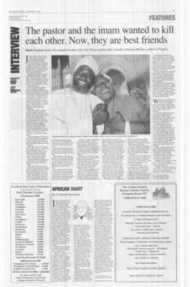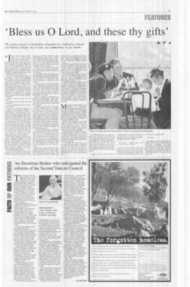Page 13, 22nd December 2006
Page 13

Report an error
Noticed an error on this page?If you've noticed an error in this article please click here to report it.
Tags
Share
Related articles
Cracking The Code
Darwinism And The Faith
Rueing The Flaw In Jungle Law
The Dangers Of The Instant Opinion
Battle Under Focus Again
Darwin to DNA
Great Tales from English History: The Battle of the Boyne to DNA by Robert Lacey, Little, Brown £14.99 ick Turpin was a thug who raped and tortured elderly victims, Neville Chamberlain won the Battle of Britain, while Captain William Bligh's Bounty had fewer floggings than any other Royal Navy ship of the time.
Robert Lacey's new book may cover the clearer air of the recent past but it illustrates just as well as the previous volumes how much history is written by the spin doctors. Along the way we find that our most cherished pub quiz staples are dubious at best, so that Nelson did not turn a blind eye at Copenhagen, nor did he say "kismet", while Captain Scott would have lived were it not for the idiotic Oates. Even the supposedly horrendous casualties of the Light Brigade were mere newspaper inaccuracy.
And though it covers the well-trodden paths of our history, Great Tales never gets bogged down in the ruthless pursuit of anecdote and trivia at the expense of narrative. Lacey recalls the disaster of Spion Kop and how the Boer War battle inspired the famous Anfield football terrace, only adding as an incidental afterthought that Winston Churchill (a reporter) and Mohandas Ghandi (an ambulance driver) must have been within shouting distance of
also avoids the twin perils of national drum-beating and what might be called autoAnglophobia.
We can marvel at the 400 soldiers who drowned on the HMS Birkenhead so the women and children might live, or view the captain's orders as rather selfish in light of his own inability swim. We can certainly be impressed with the great engineering achievement of shipping 250 tonnes of human faeces to the East End every day, yet feel some pity for the hundreds who drowned in the stuff when the Princess Alice sank in Woolwich.
And despite the terrible hardship of balding matchstick girls and suicidal feminists, this is the story of progress, from the overthrow of James II, through Dr Johnson, Darwin, the Great Exhibition and finally the discovery of DNA by Watson and Crick.
This neatly wraps things
Man, a 9,000-year-old Briton discovered in Somerset. In the same year that Tony Blair was redefining Britain as a young country, a DNA test carried out on 20 local volunteers showed that history teacher Adrian Targett was a direct descendant of Neolithic man. In comparison a Norman pedigree seems no more authentic than a dodgy Romanian passport.
This industry may be dominated by tele-storians David Starkey and Simon Schama, but Lacey's approach to history is far more human, for it is not just about remarkable personalities or social trends, but the eternal struggle for public relations, in which the Turpins of this world get all the breaks while the Captain Blighs are remembered only for their failures. For that is the story of life itself.
Ed West
blog comments powered by Disqus

















